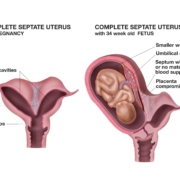High Cholesterol And Pregnancy
When you’re pregnant, making healthy choices benefits not only you but also your growing baby. Your cholesterol and triglycerides naturally rise during pregnancy, as they’re needed for the growth and development of the baby. Cholesterol is also needed to make the hormones estrogen and progesterone which play a key role during pregnancy. For women who already have high cholesterol, the levels can climb even higher which could lead to hypertension and risks. Treating conditions like high cholesterol can be more difficult during pregnancy, even though a variety of medications can manage it in nonpregnant women.
Health profesiosnals recommended to check your cholesterol and triglyceride levels during pregnancy, as they also tend to rise. In rare cases, women with very high triglycerides before pregnancy develop severely raised triglycerides. This puts you at risk of acute pancreatitis, an uncommon but serious complication that can cause severe abdominal pain and fatty spots on the skin (eruptive xanthoma).
What is high cholesterol during pregnancy?
Cholesterol increases significantly during pregnancy by about 25-50% and it can get extremely high during pregnancy. It is a type of fat that your body needs to function, but too much can clog your arteries and increase your risk of heart disease and stroke. It is carefully monitored in the non-pregnant adult population, where its association with atherosclerosis and cardiovascular disease is well understood. Researchers do not yet fully understand the effects of maternal high cholesterol on pregnancy and fetal development. However, a growing body of evidence from animal and human studies suggests adverse consequences of high cholesterol levels in pregnancy.
Cholesterol during pregnancy has some benefits:
- proper development of your baby
- production and function of estrogen and progesterone
- the development of healthy breast milk
How to treat high cholesterol during pregnancy?
During pregnancy, your doctor probably won’t prescribe medication to lower your cholesterol. However, if your levels remain high after your baby is born, you may receive medication and instructions to follow a heart-smart diet. Eating a low-fat, low cholesterol diet during pregnancy is extremely important and emphasizes the benefits of the diet.
This might include:
- increasing physical activity
- eat more fiber
- getting healthy fats like those derived from nuts and avocados
- adding omega-3-rich foods or supplements to your diet
- get healthy fats from nuts and avocado
- avoid fried foods
- limit sugar to lower triglycerides
Blood cholesterol tends to stay high for at least a month after giving birth and the same goes for Triglycerides but might go back to normal sooner in mothers who breastfeed. Wait at least six to eight weeks after giving birth before having a cholesterol test. If you are breastfeeding, wait until you’ve stopped.
In general, people with high cholesterol do not have a harder time getting pregnant than people of the same age without high cholesterol. However, there is one study that suggested it might take longer to get pregnant if a person has high cholesterol.
Disclaimer
The information, including but not limited to, text, graphics, images and other material contained on this website are for informational purposes only. The purpose of this website is to promote broad consumer understanding and knowledge of various health topics. It is not intended to be a substitute for professional medical advice, diagnosis, or treatment. Always seek the advice of your physician or another qualified healthcare provider with any questions you may have regarding a medical condition or treatment before undertaking a new health care regimen, and never disregard professional medical advice or delay in seeking it because of something you have read on this website.
References:



